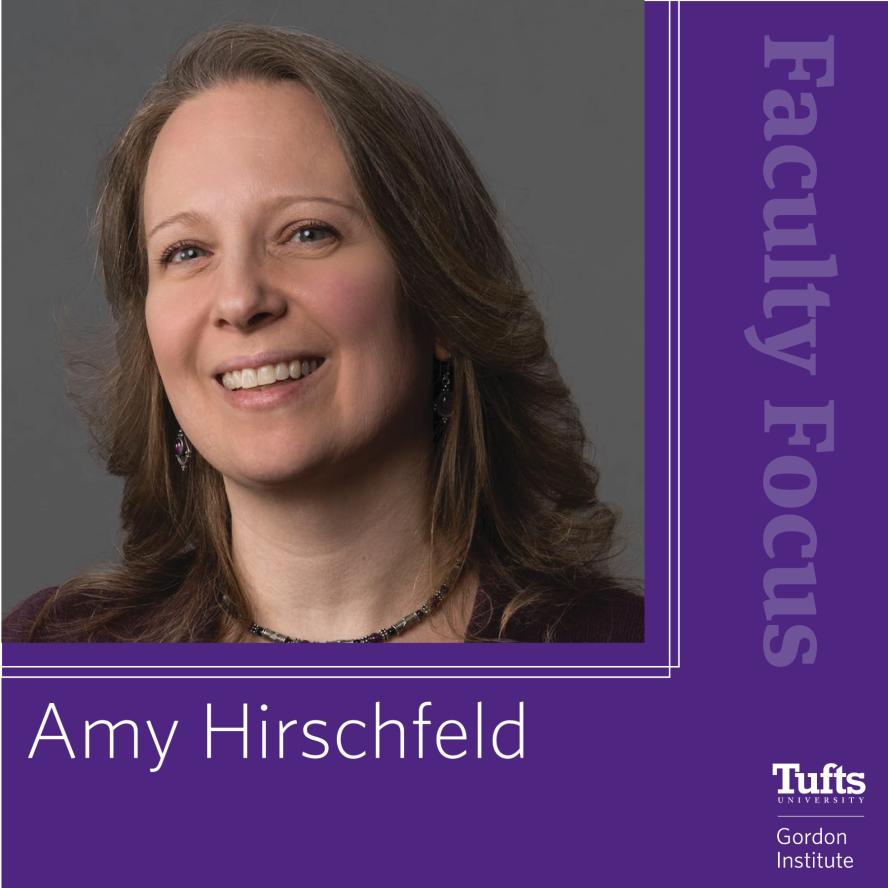Breadcrumb

Faculty Focus: Amy Hirschfeld
Our faculty are the cornerstone of Tufts Gordon Institute, supporting our students both in and out of the classroom with lessons gained through their wealth of real-world experience. We’ve interviewed some of our faculty members to highlight the unique perspectives they bring to the classroom and what inspires them to teach at Tufts Gordon Institute.
Amy Hirschfeld, previously Senior lecturer at Tufts Gordon Institute, was recently appointed the title of Distinguished Senior Lecturer. A Distinguished Lecturer is an honorary title reserved for senior lecturers who have made exceptional contributions to their disciplines, students, and the university. Distinguished Lecturers are recommended by school deans and approved by the provost and president. Amy studies the many ways that communication affects our personal and professional lives, and teaches courses on technical and business communication, including “Technical and Managerial Communication,” “Business Writing for Technical Professionals,” and “Presentations and Public Speaking for Technical Professionals.”
Who inspires you the most and why?
Tufts students inspire me with their dedication to making the world a better place. I am continually inspired by their enthusiasm for learning, resilience in the face of social and personal challenges, and creativity and compassion in the way they approach their lives and engage with others.
What is the most enjoyable part of teaching for Tufts Gordon Institute (TGI)?
Because TGI is not a traditional academic department, both the students taking TGI courses and the faculty teaching the courses have so many different personal and professional interests and experiences. I have the opportunity to work with students from dozens of different departments across the School of Engineering, the School of Arts and Sciences, and the School of the Museum of Fine Arts. Because the TGI faculty and staff have such a breadth and depth of knowledge from both industry and academia, there is always an opportunity to learn something new and experiment with innovative ideas.
What is the single most important takeaway that you hope your students learn from your teaching?
Communication must be inclusive to be effective. Many students learn to communicate throughout their academic careers with an expectation that the more complex language you use and the more information you include, the more knowledgeable you must be, which leads to inaccessible and exclusive forms of communication being valued. Communication should be focused on creating shared understanding and making ideas accessible. The more people who can quickly and easily understand your ideas, the more effective your communication is.
What is the best piece of advice that anyone ever gave you?
Make space in your life for things that nourish your soul, and follow a path that is true to yourself, even when it is not what others expect of you. This advice I got from my father, not in words but in the example of the way he lived his life.
Where would you be if you could be anywhere in the world right now and why?
When I was working as an archaeologist early in my career, I visited or worked in several countries in the Mediterranean, North Africa, and the Arabian Peninsula, where I fell in love with the beautiful and varied natural landscapes, the rich cultures and histories, and the warm and welcoming people. One of my favorite places was Oman, and I’d love to spend time there again. (Of course, the place in the world I always most want to be is with my three dogs, which means some hesitation at the thought of being anywhere else).
What is the most important thing for a student to focus on with regard to effective communication?
Knowing your purpose and understanding your audience are the most important parts of effective communication and frame all other aspects of communication. When you make intentional decisions about your communication focused on your purpose and your audience, your communication will become more focused and effective.
What is the one thing that you know now that you wish you had known when you started your career?
I wish I had known at the start of my career how to better use my voice to advocate for myself and for others. In my teaching now, I include a focus on “using your voice” so that students starting their careers will recognize that the ways they use their voices or their silences can have a profound effect on the future, for themselves and for the world their generation is shaping.